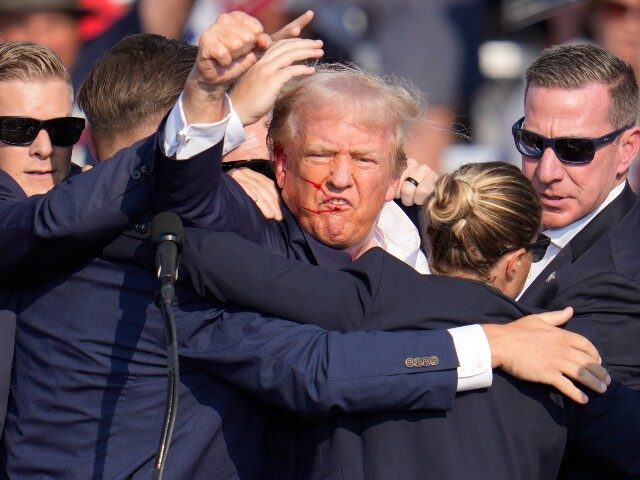Multiple Mexican corridos, or narrative folk songs, telling the story of former President Donald Trump’s narrow escape from death in a July 13 assassination attempt have gone viral in the past week on social media. The posts rejoice in Trump as divinely protected and a man who “has never known fear.”
Corridos are traditional folk songs, often using heavy accordion, that narrate dramatic events in history, the news, or popular mythology. They were originally a form of spreading news of revolutionary heroes in the 1800s and have since evolved to lionize popular figures in literature, news, and politics. Some corridos also celebrate popular drug lords who amass power by filling power vacuums left by corrupt politicians, perhaps most famously depicted in the United States in the television series Breaking Bad.
Two corridos – one by the Grupo Norteño Gethsemani de Los Angeles and one Conjunto Diamante Norteño – recounting the events of July 13, in which a shooter later identified as 20-year-old Thomas Matthew Crooks attempted to kill Trump at a campaign rally – have propagated on social media in the past week.
Grupo Norteño Gethsemani de Los Angeles’s “Trump [Assassination] Attempt Corrido” declares Trump’s escape a “miracle” and proclaims him protected by Jesus Christ.
“His head was the target/giving him death was the objective/who knows for what reason they don’t want Trump alive,” the band sings, “but a miracle happened/because that shot missed/ the very scared people thought that he had died and amid the cries more shots were heard.”
“With the blood on his face, Donald Trump got up/lifting both his hands/saying ‘I’m here/let’s keep fighting’/and the people became happy,” the song continues. “Donald Trump is still alive because Christ protects him.”
“Even though many wont understand it, nobody can stop Trump,” it concludes. “Though some people may not like it/ he will be president again.”
A separate corrido, written by composer Pepe Sánchez and reportedly performed by the Conjunto Diamante Norteño, appeared on Tiktok shortly after the assassination attempt and has attracted millions of views.
“Trump is a brave man who has not known fear/ because he looked calm and there are many witnesses of that/he didn’t cower at all despite what happened,” the song recounts. “Trump was saved by a miracle/ but if I look closely at why he received a shot on one of his ears/the sniper was aiming at his head.”
This song also criticizes the Secret Service’s inaction in the face of a threat despite multiple witnesses informing law enforcement that Crooks was on a nearby rooftop and clearly armed.
“People noticed that sniper/they told the police and they didn’t mobilize/ they came into action after he fired,” the song recalls.
As a wealthy celebrity and television personality, Trump has long been the subject of popular music, earning the title of the 1990 song “Donald Trump (Black Version)” by the band The Time. Not all depictions have been positive, however, and the negative spin of corridos in past elections indicates that his reputation among Mexicans and Mexican-Americans has changed in the past decade. For example, in 2015, the band Los Traviezos de la Zierra published a “Corrido a Donald Trump” that described him as “crazier than a goat” and claimed that the then-presidential candidate “hates us so much.”
Trump has historically performed better with other sectors of the large and diverse Hispanic community, particularly the majority Cuban-American population of Florida. In 2020, the salsa band Los 3 de la Habana released a song called simply, “Trump Song,” that celebrated Trump voters and became a staple at majority-Hispanic Republican events.
Joe Biden, who at press time is believed to remain the president of the United States, has also been the subject of corridos – but not as a hero of the story. Migrants at the U.S. southern border sang a plea to Biden in 2021 to let them into America.
“Joe Biden we ask and pray to you … all we want is for you to open the path,” a group on the border sang that year.
Vice President Kamala Harris is lesser known among Latin Americans and thus has been featured less often in Hispanic music. In March, however, Harris was the focus of an embarrassing incident in Puerto Rico in which she danced along to a song protesting her presence on the island.
“We want to know Kamala/what you came to do here,” the singers chanted, implying that she had come to the island for a photo opportunity that would not benefit local residents.
The Pew Research firm found in a survey taken from July 1 to 7 that the Hispanic vote was split 36-36 between Biden and Trump – leaving unclear how the dramatic changes to the race, from Biden’s withdrawal to Trump’s assassination attempt survival, will affect voter trends.


